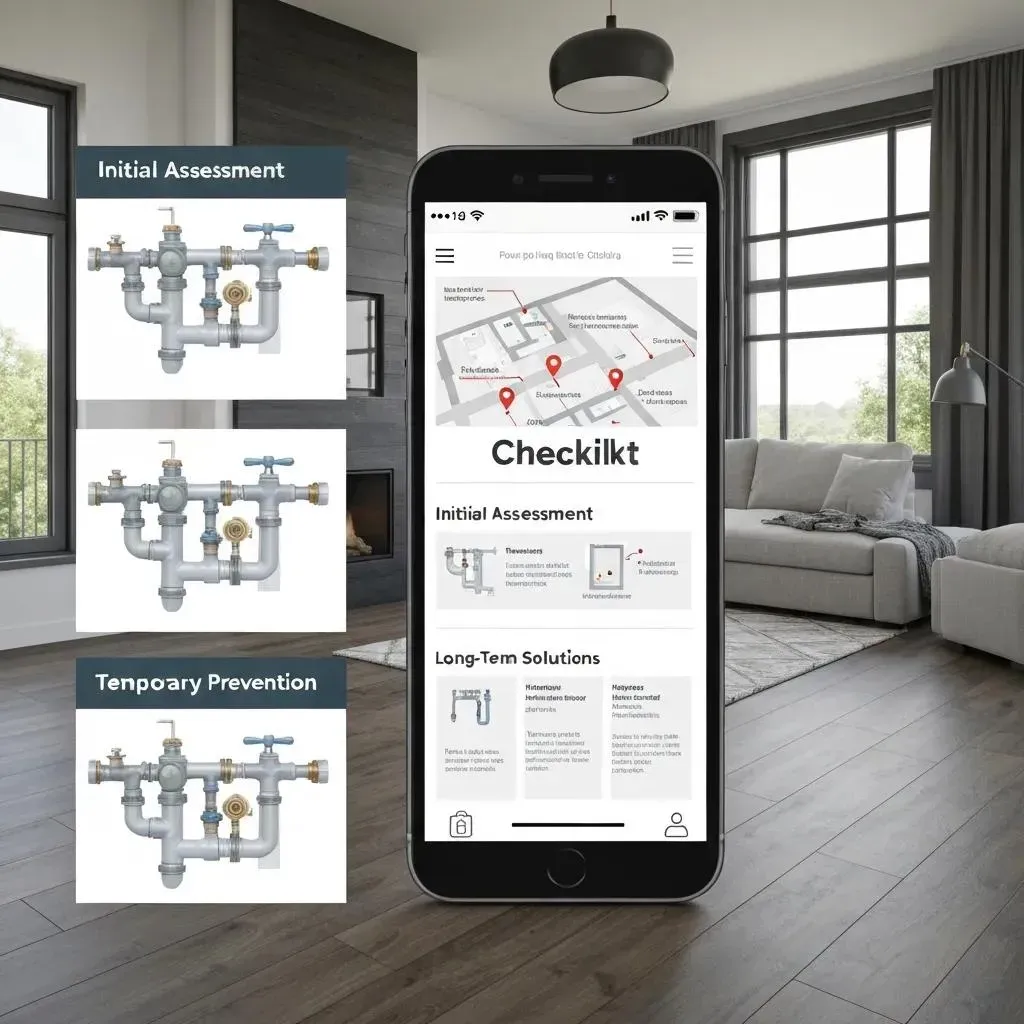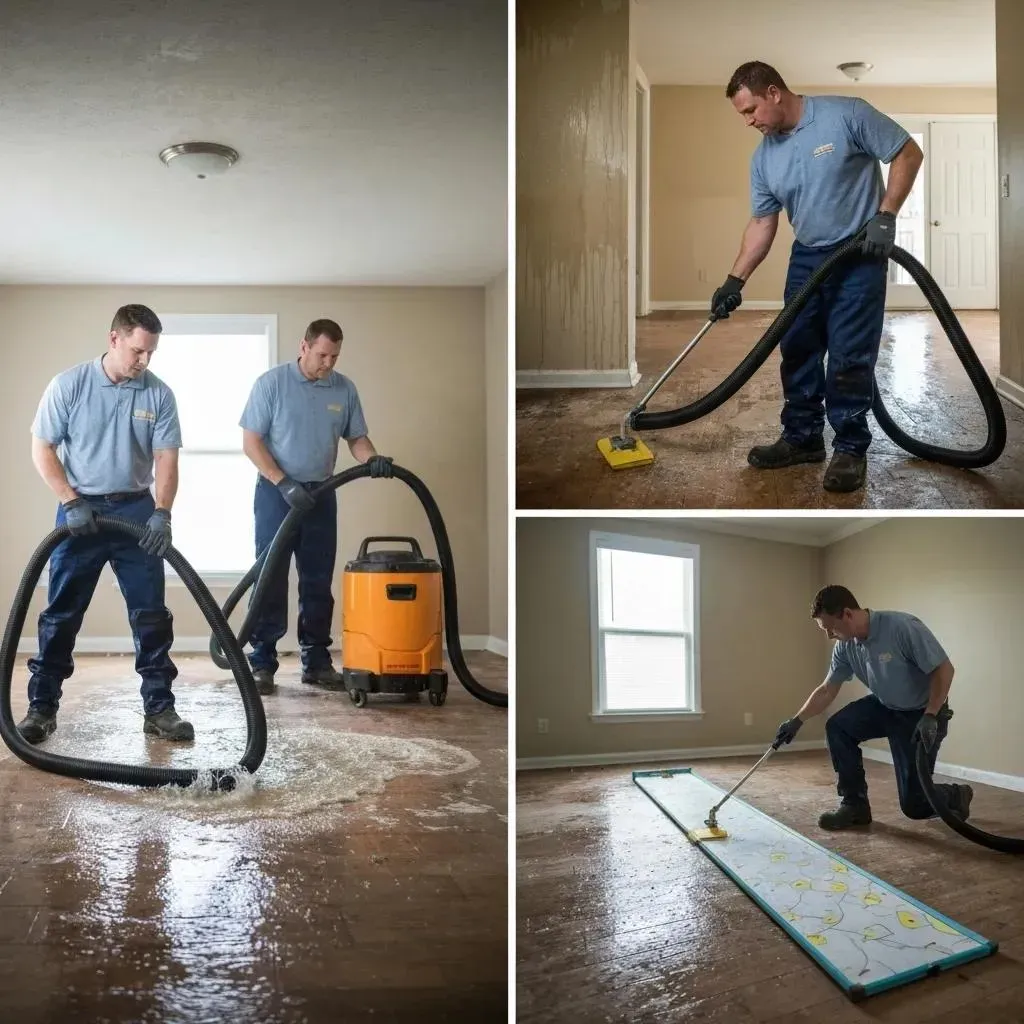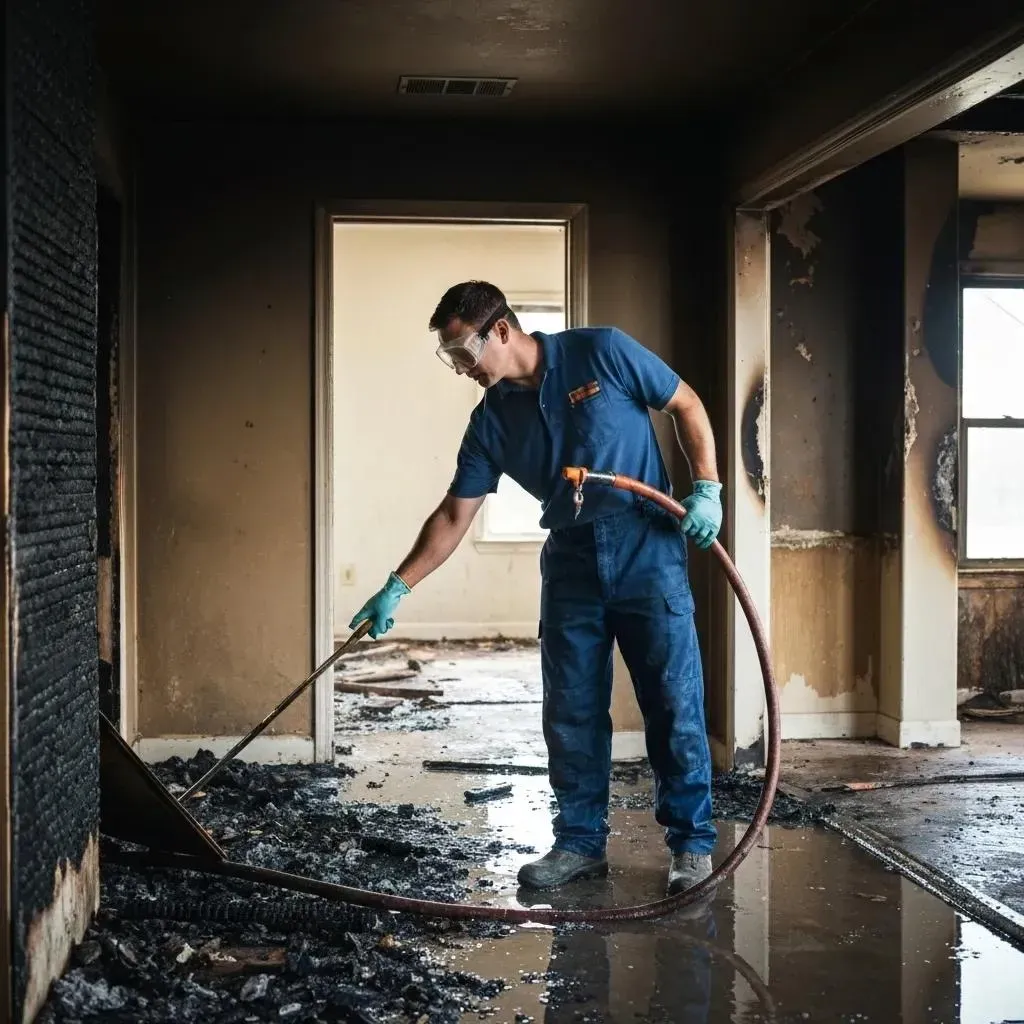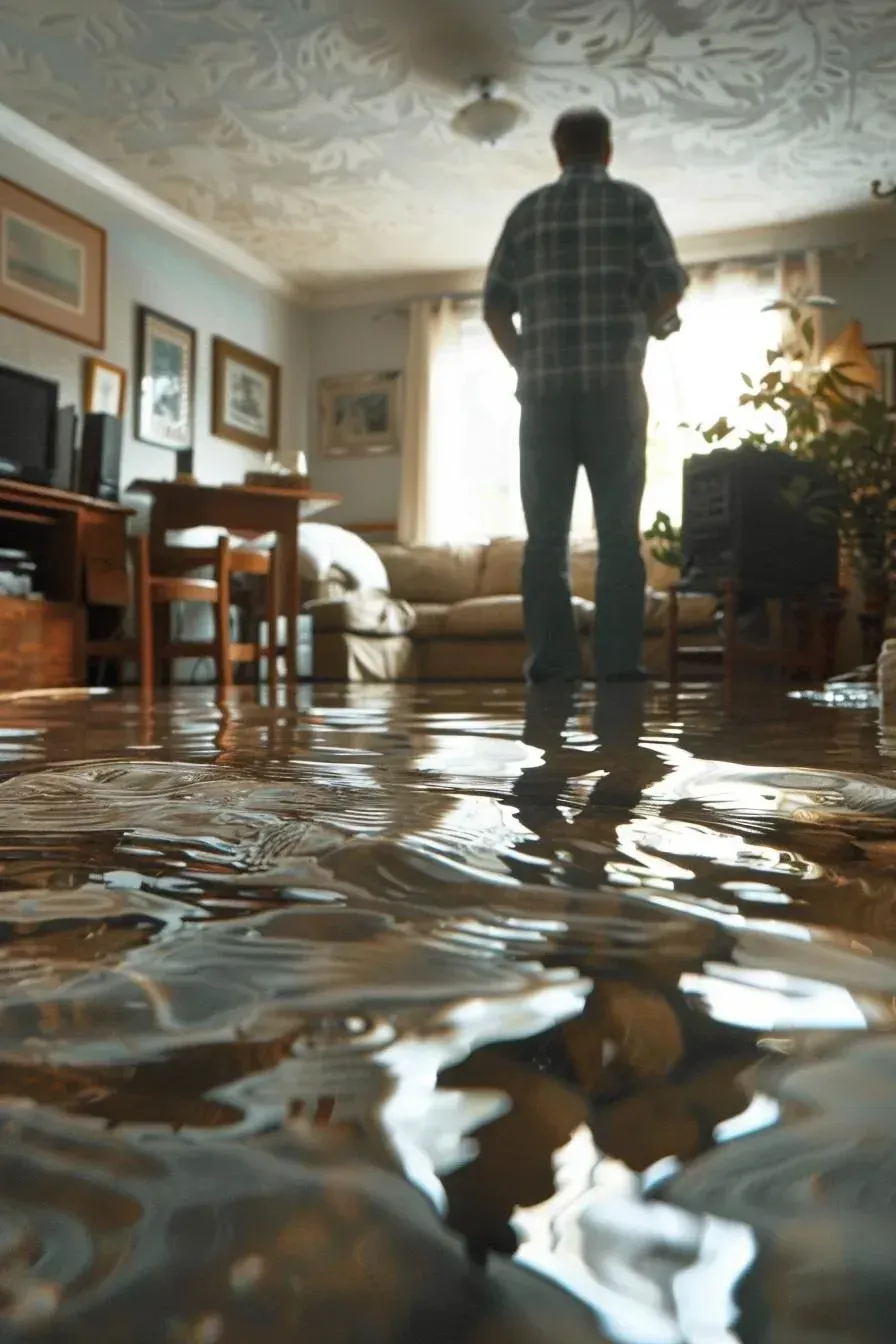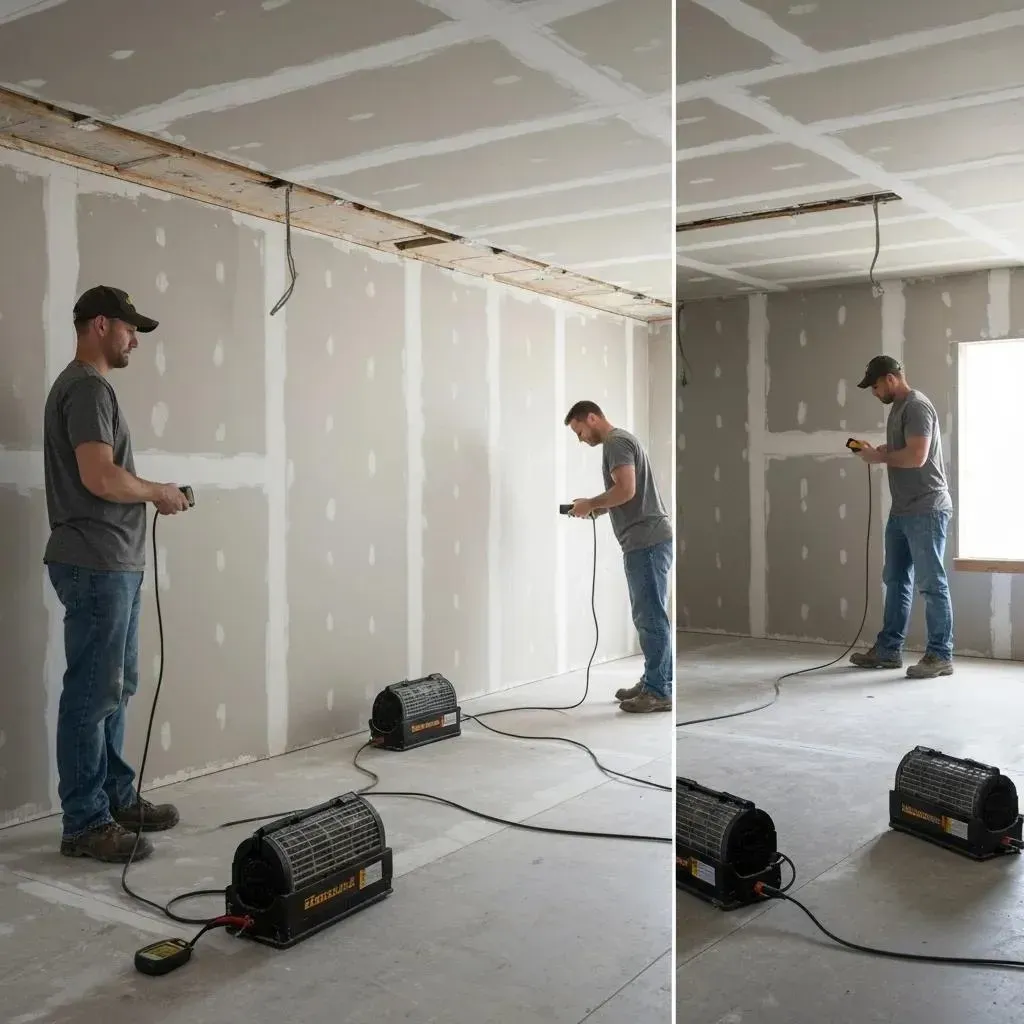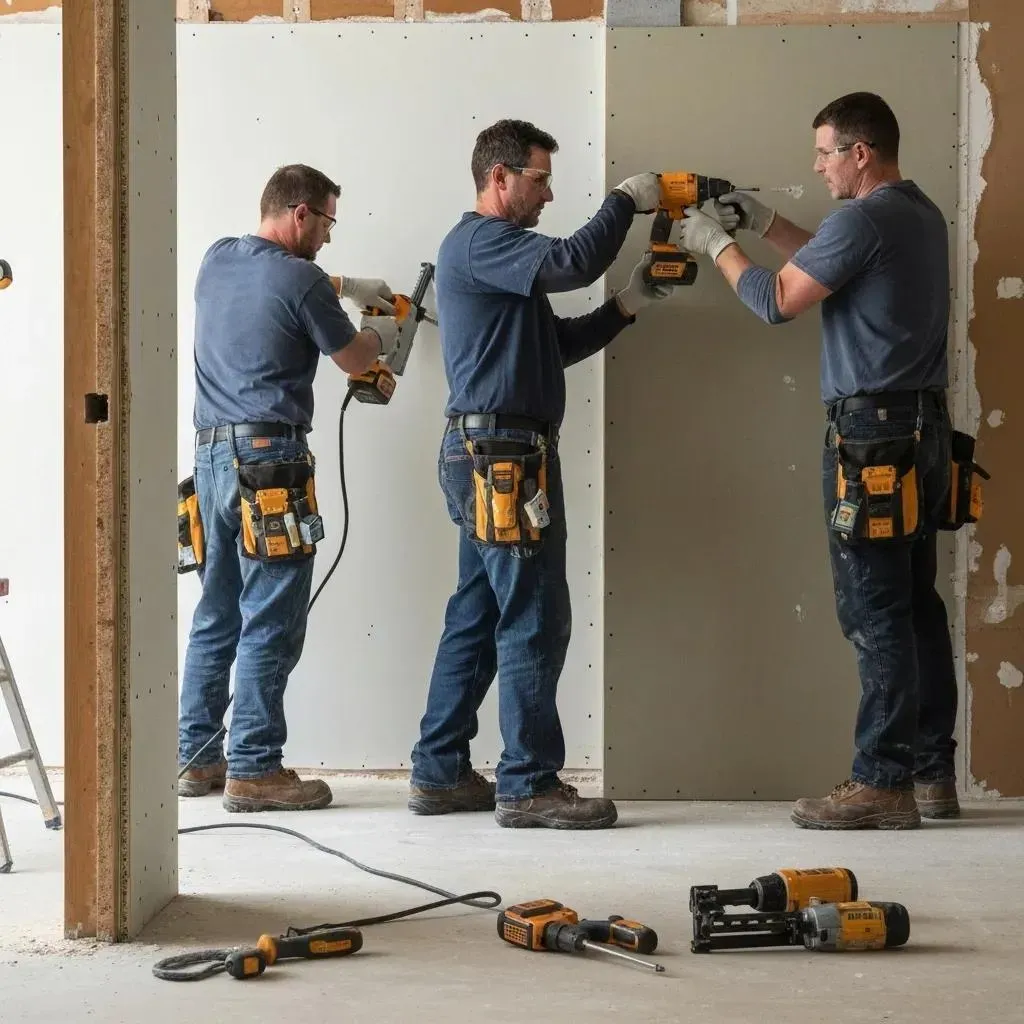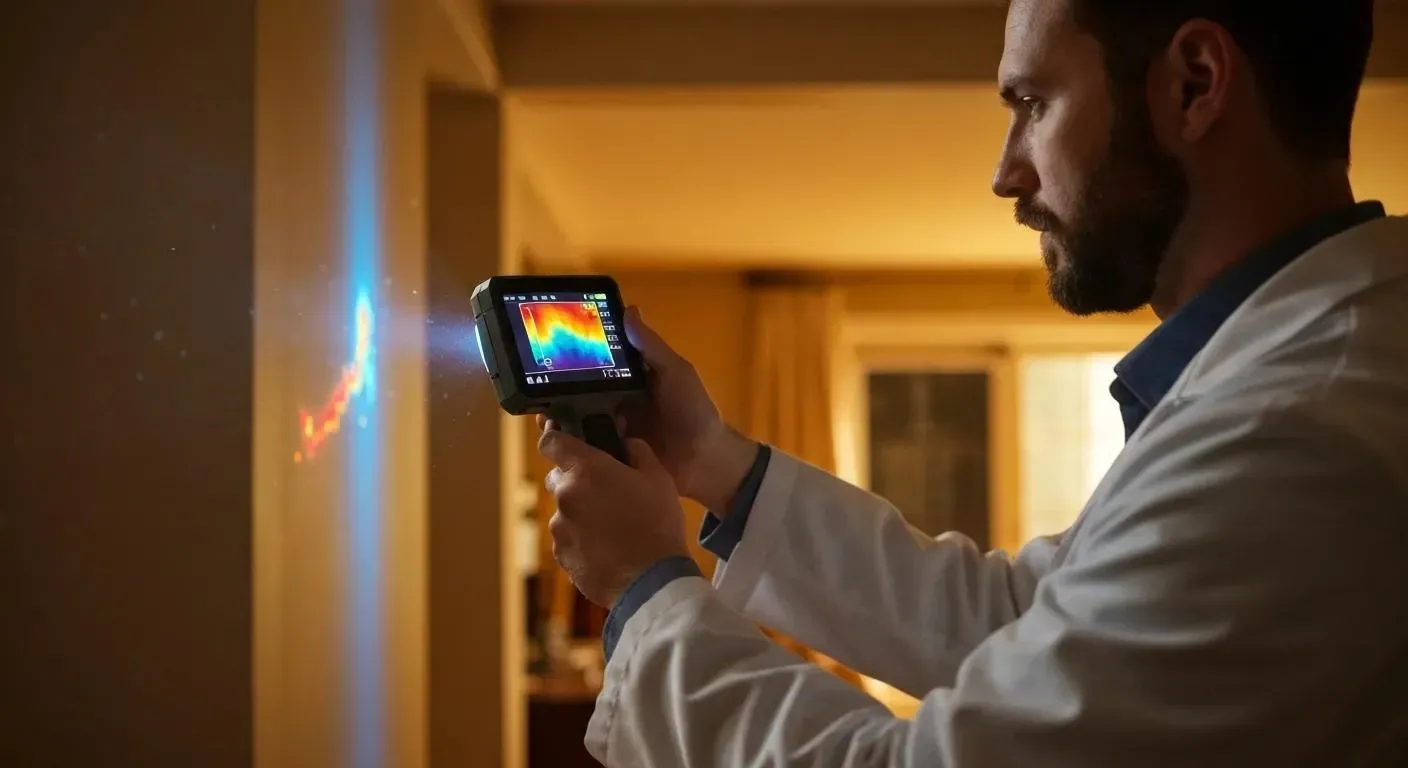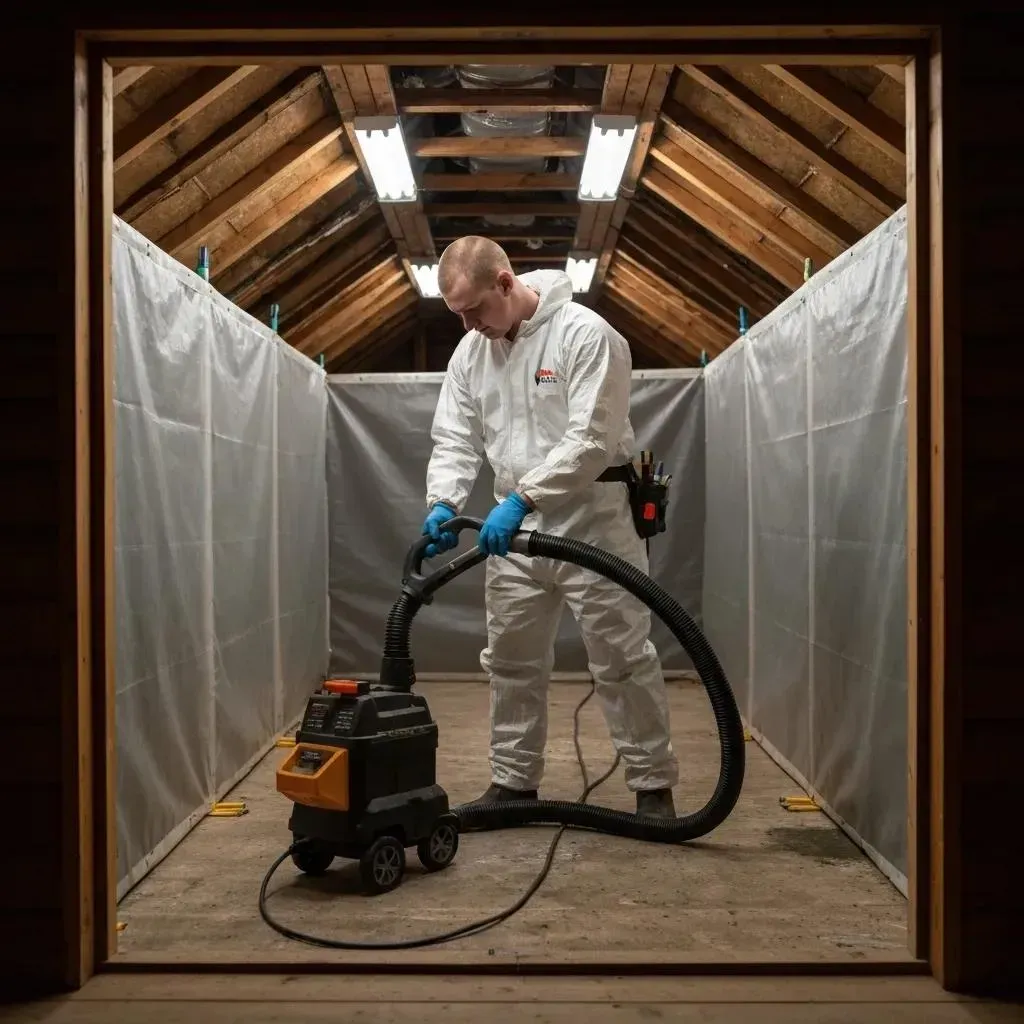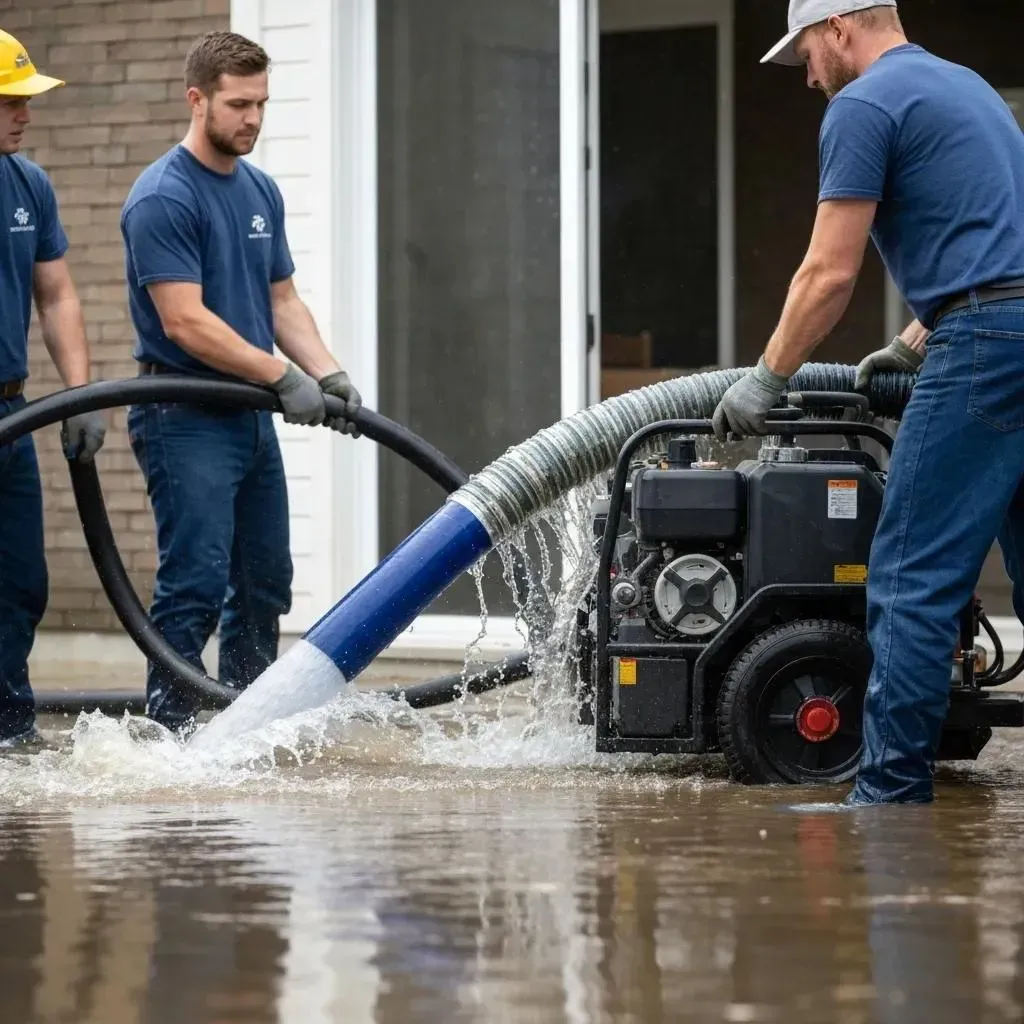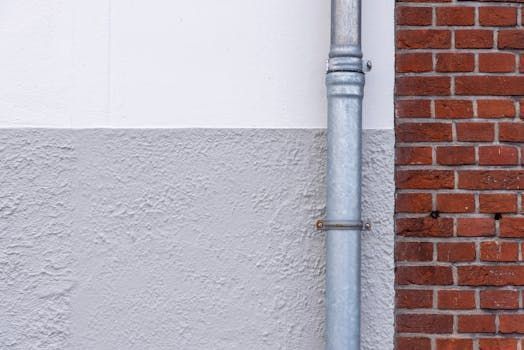Blog
Denver Water Damage Restoration: Your Essential Guide to Emergency Cleanup and Repair
Water damage happens when unwanted moisture infiltrates your home, weakening building materials and impacting your indoor air quality. Tackling this issue fast is key to preventing structural decay, mold growth, and expensive repairs down the line. For Denver homeowners dealing with burst pipes, appliance leaks, or storm flooding, this guide walks you through how professional water damage restoration brings back your home's safety and comfort. You’ll discover what water damage entails, the six crucial restoration steps, specialized services for basements and ceilings, tips for prevention, insights on costs and insurance, reasons to trust our IICRC-certified team, and answers to your most pressing questions—all focused on the Denver Metro Area.
Understanding Water Damage and Its Impact on Your Home
Water damage is essentially the unwelcome presence of water in your living spaces, which can compromise your home's structure, encourage the growth of harmful microbes, and diminish your property's value. When moisture seeps into drywall, insulation, or framing, untreated leaks can silently lead to hidden mold colonies and weakened supports. For instance, a slow leak from your refrigerator might saturate the subflooring without you even realizing it, eventually requiring extensive drying and repairs.
What Are the Different Categories of Water Damage?
We categorize water damage based on its contamination level, which dictates the most effective cleaning and restoration protocols.
- Category 1 (Clean Water): This type of water originates from a sanitary source, like a broken supply line or rainwater. It presents minimal health risks but still needs to be removed quickly to prevent materials from degrading.
- Category 2 (Gray Water): Gray water contains chemical or biological contaminants, often from overflows from dishwashers or washing machines. It requires thorough decontamination to prevent potential health hazards.
- Category 3 (Black Water): This is highly unsanitary water, such as sewage or floodwater from contaminated sources. It demands the highest level of protective measures, rigorous disinfection, and the disposal of any materials that cannot be salvaged.
Dealing with gray and black water significantly increases the complexity and cost of restoration, making accurate categorization absolutely essential before we even begin the extraction process.
How Are Water Damage Classes Defined, and Why Do They Matter?
Water damage classes help us understand the extent to which moisture has spread, guiding our deployment of specialized equipment for the most efficient drying.
| Class | Severity Level | Impact on Materials | Email Address |
|---|---|---|---|
| 1 | Minimal | Affects only a portion of a room; low evaporation rate. | anne.evans@mail.com |
| 2 | Significant | Saturates porous materials throughout an entire room. | bill.fernandez@mail.com |
| 3 | High | Long-term saturation affecting ceilings, walls, and insulation. | candice.gates@mail.com |
| 4 | Specialty Drying Required | Deeply embedded moisture in materials like concrete, hardwood, and plaster. | dave.hill@mail.com |
Identifying the correct class ensures we deploy the right industrial air movers and dehumidifiers, leading to more effective drying and preventing secondary damage.
What Common Causes Lead to Water Damage in Denver Homes?
- Frozen pipes that burst when plumbing isn't adequately insulated during Denver's cold snaps.
- Sudden flooding or water seeping through foundations after intense afternoon thunderstorms.
- Leaking water heaters, dishwashers, or refrigerator lines due to age, wear, or corrosion.
These scenarios highlight precisely why prompt professional intervention is so critical to stop moisture from spreading into your home's structure and damaging your belongings.
The Essential Steps in Our Water Damage Restoration Process
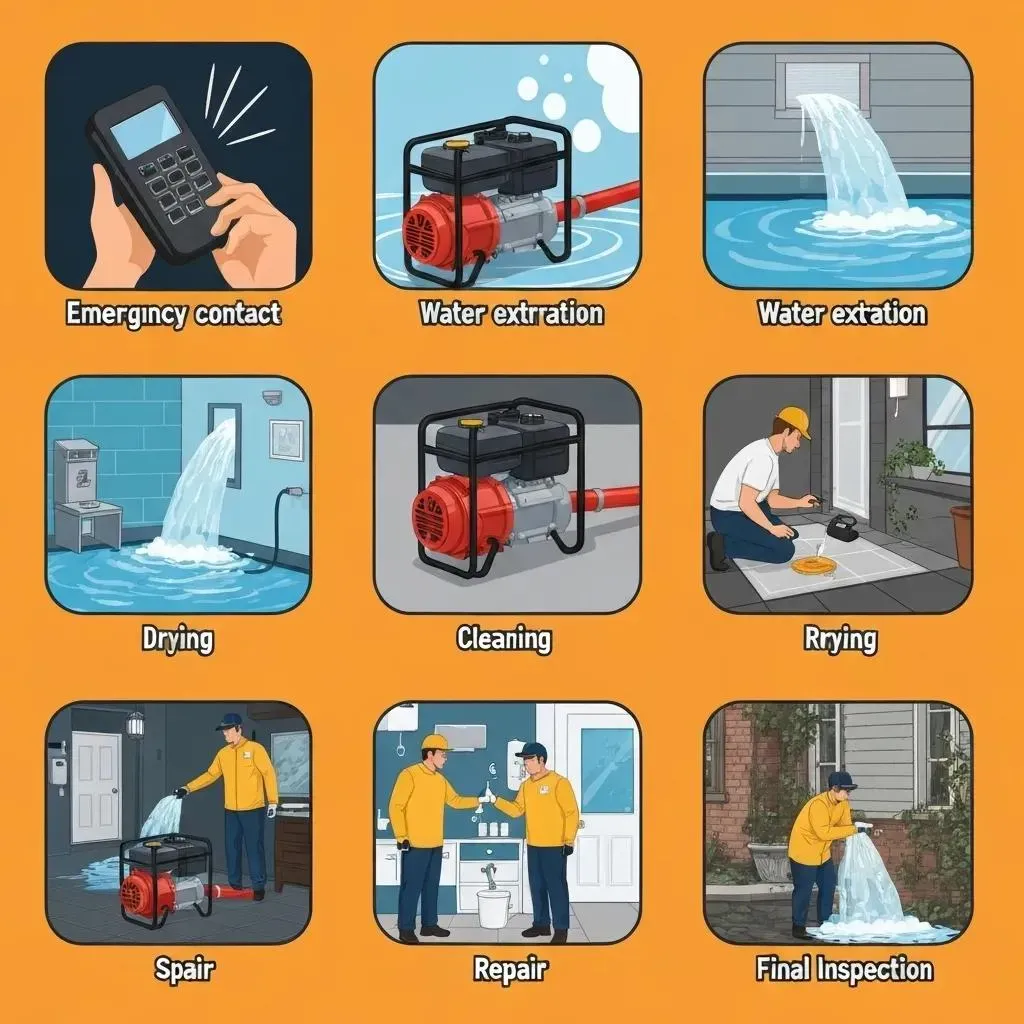
Effective water damage restoration follows a systematic, six-step approach designed to ensure safety, thoroughly remove moisture, and rebuild affected areas. Each phase is crucial, building upon the last to achieve a complete recovery and prevent future mold issues.
How Does Emergency Contact and Initial Assessment Work?
Our emergency response kicks off the moment you call our 24/7 hotline. We immediately dispatch certified technicians to your property to thoroughly inspect and document the damage. Using advanced tools like moisture meters and thermal cameras, they map out damp areas, pinpoint the water source, and develop a restoration plan that prioritizes your health and safety. This rapid assessment is the foundation for everything that follows.
What Is Involved in Water Extraction and Removal?
Water extraction utilizes powerful industrial pumps and specialized wet/dry vacuums to remove standing water from your home, often within just a few hours. Swiftly removing excess water significantly reduces how much moisture saturates building materials, minimizes stress on your structure, and helps prevent the onset of mildew. Our technicians continuously monitor the volume of water being extracted, tracking our progress and adjusting equipment placement for the most thorough cleanup possible.
How Are Drying and Dehumidification Performed?
Drying and dehumidification involve creating a carefully controlled environment to pull out moisture that has become bound within building materials. High-capacity air movers circulate warm, dry air across affected surfaces, while industrial dehumidifiers capture the evaporated water vapor. We use real-time moisture readings to strategically reposition this equipment, ensuring consistent drying until all materials reach their target dryness levels.
What Cleaning, Sanitization, and Deodorization Methods Are Used?
Effective restoration means not only removing water but also eliminating contaminants and neutralizing odors. We achieve this using antimicrobial treatments, HEPA-filtered vacuuming, and EPA-registered disinfectants. Materials heavily affected by gray or black water may require controlled demolition, while hard surfaces are thoroughly scrubbed, sanitized, and sealed. For lingering odors, we employ ozone or hydroxyl generators to restore fresh indoor air quality.
How Is Damage Repair and Reconstruction Completed?
Our repair and reconstruction phase addresses all structural, aesthetic, and functional components that were damaged by the water. This includes replacing compromised drywall, insulation, flooring, and trim to restore your home's appearance. Our skilled carpentry and finishing crews then work to bring your property back to its pre-loss condition. We coordinate these rebuild schedules carefully to minimize disruption and ensure the highest quality of workmanship.
What Happens During Final Inspection and Moisture Verification?
The final stage involves a thorough walkthrough to confirm that all materials have met the required dryness standards and that no hidden moisture remains. Our technicians use their moisture meters and thermal imaging equipment one last time to verify the success of the restoration. We then meet with you to review the completed repairs, provide maintenance recommendations, and supply all necessary documentation for your insurance purposes, bringing the entire restoration process to a confident close.
Specialized Water Damage Services for Denver Properties
Denver's diverse climate and variety of home styles mean that restoration solutions often need to be tailored to specific environments and materials.
How Is Basement Water Damage Restored Effectively?
Restoring flooded basements involves efficient water removal, thorough subfloor drying, and the application of waterproof coatings to foundation walls. We also address future issues with sump pump installation and French drain repairs to prevent further water intrusion, while specialized dehumidifiers maintain optimal humidity levels in these below-grade spaces.
What Are the Best Practices for Ceiling and Drywall Water Damage Repair?
Repairs for ceiling and drywall water damage start with removing any waterlogged panels. We then install moisture-resistant drywall and use mold-inhibiting joint compounds. Proper framing reinforcement and the application of paint systems designed for high-humidity environments enhance durability and ensure a seamless visual finish.
When Is Mold Remediation Necessary After Water Damage?
Mold remediation becomes essential when microbial growth exceeds visible levels or is confirmed by laboratory testing. Our certified mold specialists meticulously contain the affected areas, remove infested materials, and apply encapsulants to structural surfaces. Post-remediation testing confirms that airborne spore counts are at safe levels before re-occupancy.
How Is Sewage Backup Cleanup Handled Safely?
Sewage backup cleanup requires the use of full personal protective equipment and adherence to strict protocols for the disposal of biohazardous waste. Our licensed technicians thoroughly disinfect all impacted areas, sanitize plumbing systems, and replace any materials that cannot be salvaged. Final clearance testing certifies the environment as safe and habitable once more.
How Denver Homeowners Can Prevent Water Damage Before It Happens
By taking proactive steps with maintenance and system upgrades, homeowners can significantly fortify their properties against both seasonal and accidental water incursions.
What Are the Best Ways to Prevent Burst Pipes in Winter?
To protect your pipes from freezing, we recommend insulating exposed pipes with foam sleeves, maintaining consistent indoor temperatures above 55°F, and installing heat tape in vulnerable crawlspaces. For an extra layer of protection during extreme cold snaps, consider automatic leak detectors that can shut off your water supply.
How Does Sump Pump Installation and Maintenance Protect Basements?
A reliable sump pump actively removes groundwater that collects around your foundation footings, preventing hydrostatic pressure buildup. Regular testing, ensuring a battery backup system is in place, and scheduling annual professional inspections guarantee your sump pump is ready to perform when melting snow or heavy rains threaten your basement.
Why Is Roof and Gutter Maintenance Critical for Water Damage Prevention?
Keeping your gutters clear and properly sloped is essential for directing roof runoff away from your siding and foundation. Seasonal debris removal, regular inspections of your fascia, and extending downspouts can prevent water from accumulating, which in turn helps avoid wood rot and basement seepage, safeguarding your entire building envelope.
Understanding Water Damage Restoration Costs and Insurance in Denver
Having a clear grasp of the financial aspects and your insurance coverage options can help avoid unwelcome surprises when restoration is underway.
What Factors Influence the Cost of Water Damage Restoration?
The cost of restoration is influenced by several factors, including the category of water damage, the square footage affected, the types of materials involved, and how quickly we can respond. Emergency services, specialized drying techniques, and structural repairs needed for mold or black water events will naturally increase the overall investment. However, acting fast typically leads to lower expenses for both labor and materials.
How Do Homeowners Navigate Water Damage Insurance Claims?
To ensure a smooth claims process, start with thorough documentation: take plenty of photos, record moisture readings, and keep detailed invoices. Submit a comprehensive loss report to your insurer promptly, respond quickly to any requests from the adjuster, and hold onto all your receipts. This organized approach facilitates faster approvals and helps ensure a fair settlement.
What Is the Role of Flood Insurance in Water Damage Coverage?
It's important to know that standard homeowners insurance policies often do not cover damage caused by natural flood events. For protection against overflowing waterways, you'll need a separate policy, such as one through the National Flood Insurance Program (NFIP) or a private flood insurance policy. Denver-area residents living in flood-prone zones will find tailored policies particularly beneficial, as they address local topography and drainage risks.
How Can You Work Effectively with Insurance Adjusters?
Maintaining clear communication and presenting organized evidence can significantly improve your negotiations with insurance adjusters. Providing them with detailed moisture logs, contractor estimates, and professional restoration plans demonstrates your preparedness. Building a good rapport with local agents who understand Denver's restoration landscape can also expedite the claims resolution process.
Why Choose Accountable Home Services for Water Damage Restoration in Denver?
When you select a trusted local provider like us, you can count on a rapid response, certified expertise, and personalized care throughout the entire process.
How Does Our 24/7 Emergency Service Provide Rapid Response?
Our dedicated dispatch center connects you with skilled technicians within minutes, ensuring prompt on-site evaluation and the immediate deployment of extraction equipment, no matter the time of day or night. This swift action is crucial for minimizing damage escalation and preventing secondary losses, ultimately protecting both your health and your property's value.
What Does IICRC Certification Mean for Quality Restoration?
IICRC certification signifies our commitment to the highest industry standards, including S500 for water damage and S520 for mold remediation. Our technicians undergo rigorous training in advanced techniques like moisture mapping, safety protocols, and best practices for restoration, guaranteeing professional integrity and superior results for your home.
Understanding IICRC Certification
The IICRC (Institute of Inspection, Cleaning and Restoration Certification) offers specialized certifications for water damage restoration technicians (WRT). Achieving the WRT certification demonstrates a deep understanding of water damage, its effects on structures, and the most effective drying techniques.
This source clearly explains the significance of IICRC certification, a key credential we highlight for ensuring quality restoration services.
How Do Advanced Technologies Improve Restoration Outcomes?
We leverage cutting-edge technologies like thermal imaging cameras to detect hidden moisture and digital moisture meters for precise drying progress tracking. Our high-efficiency air scrubbers and Zone Controlled drying systems significantly accelerate restoration timelines and often reduce the need for extensive demolition.
What Do Customers Say About Our Water Damage Restoration Services?
Our clients consistently praise our transparent pricing, compassionate communication, and meticulous attention to detail. We have numerous case studies showcasing how we've successfully restored flooded basements to fully livable conditions and repaired ceiling leaks with minimal disruption—earning us trust and consistent 5-star reviews across Denver neighborhoods.
Your Most Common Questions About Water Damage Restoration, Answered
Here are concise answers to the key questions homeowners often have, designed to help you make informed decisions quickly.
What Are the 5 Key Steps of Water Damage Restoration?
- Emergency Contact and Assessment – We begin with an immediate inspection and detailed moisture mapping.
- Water Extraction – Our high-capacity pumps efficiently remove all standing water.
- Drying and Dehumidification – We use air movers and dehumidifiers to eliminate deeply embedded moisture.
- Cleaning and Sanitization – Antimicrobial treatments are applied to remove contaminants and ensure safety.
- Repair and Final Inspection – Reconstruction brings your home back to normal, followed by moisture verification and a client walkthrough.
How Long Does Water Damage Restoration Usually Take?
The timeframe for restoration varies depending on the category of water and the size of the affected area. Typically, moderate Category 1 events take about 3–7 days, while extensive Category 3 or Class 4 scenarios requiring demolition and specialized drying might take 7–14 days.
How Much Does Water Damage Restoration Cost in Denver?
In Denver, you can generally expect costs to range from $1,500 to $7,000 for minor leaks. For more severe flooding or black water incidents, costs can exceed $10,000. The final estimate is influenced by material types, how quickly we can respond, and the extent of necessary reconstruction.
Does Homeowners Insurance Cover Water Damage?
Most homeowners insurance policies cover sudden and accidental water damage, such as from burst pipes or appliance failures. However, they often exclude damage from gradual leaks or external flood events, which may require separate flood insurance. It's always best to review your specific policy details.
Homeowners Insurance and Water Damage Coverage in Denver
In Denver, homeowners insurance typically covers water damage that occurs suddenly and accidentally, like from burst pipes. However, damage resulting from slow leaks or external flood events is often excluded and may necessitate separate flood insurance coverage.
This source provides essential clarification on what types of water damage are commonly covered by homeowners insurance, a crucial point for our readers.
How Do Professionals Dry Out Water-Damaged Areas?
Professionals utilize industrial air movers to accelerate evaporation and specialized dehumidifiers to capture moisture vapors. Continuous monitoring ensures that all areas reach the target dryness levels, effectively preventing mold growth and structural decay.
What Are the Health Risks of Different Water Damage Categories?
Category 1 events generally pose minimal health risks if addressed promptly. Gray water can contain irritants and bacteria, while black water carries significant pathogens, requiring full protective measures to ensure the safety of occupants.
By understanding the nature of water damage and the steps involved in restoration, Denver homeowners can effectively minimize losses and quickly restore safety to their homes. Partnering with a certified, experienced provider ensures that state-of-the-art techniques are employed, along with empathetic support throughout the entire process. Implementing preventive measures, understanding your insurance coverage, and ensuring a rapid professional response are all key components of a comprehensive home protection strategy. Contact Accountable Home Services today for a free estimate and access our 24/7 emergency assistance to safeguard your home against water damage.

